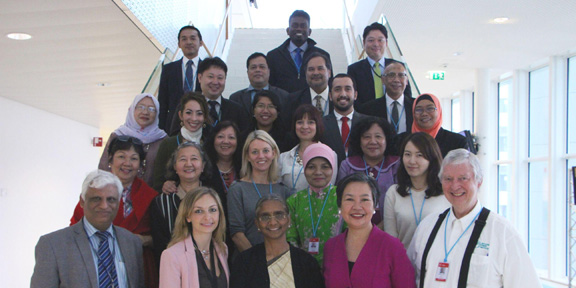
Taking another opportunity to help develop nuclear science education in the country, the International Atomic Energy Agency (IAEA) has selected the Philippines as one of the pilot countries in launching an outreach program on nuclear science and technology for secondary schools through the collaboration of the Philippine Nuclear Research Institute-Department of Science and Technology (PNRI-DOST) and the Quezon City Division of City Schools of the Department of Education (DepEd).
Under Project RAS/0/065 on Supporting Sustainability and Networking of National Nuclear Institutions in Asia and the Pacific Region, the country was chosen along with Indonesia, Malaysia and the United Arab Emirates in addressing what the IAEA recognizes as a very vital area in reaching out and developing the youth’s interest in nuclear science and technology by adopting the best practices in science education for secondary schools in the region.
Representatives from the participating Member States in the Asia-Pacific Region met at the IAEA Headquarters in Vienna, Austria from October 14 to 17 for the insights and experiences of experts from the IAEA, United States, United Kingdom, Japan and Australia and the establishment of national work plans to implement the outreach program in the pilot countries. The Philippines was represented by Ms. Rhodora Leonin, Head, Nuclear Information & Documentation Section and Mr. Roel Loteriña, OIC, Nuclear Training Center of PNRI, as well as Ms. Helen Grace Go and Ms. Ma. Violeta Tupas of DepEd.
The IAEA developed a compendium of resources and activities for use by high school teachers and students, which will be tailored to the flow of DepEd’s K to 12 Basic Education Curriculum, such that it may touch on the basics of nuclear science and its applications.
Beyond raising awareness and understanding of nuclear concepts and applications, the program also intends to encourage more students to eventually engage in Science, Technology, Engineering and Mathematics (STEM) careers after graduating from college.
For the Philippines, the collaborating agencies plan to hold a special seminar and workshop for high school teachers and students.
The agencies are also planning to conduct a weekly extracurricular activity dubbed as Science on Saturday (S.O.S.) which aims to enhance the nuclear experience for younger students through practical, hands-on exercises such as simple classroom and outdoor experiments, science quiz bees, essay, poster and chart competitions, and field trips to nuclear research facilities.
The program will also address the issue of women empowerment with the aptly named Powerful Opportunities for Women Eager and Ready for Science Engineering and Technology (POWER SET) Program, which will prepare aspiring female high school students who perform well in mathematics and science subjects for science-related courses and careers through scholarship opportunities, mentoring by industry professionals, visits to science and technology facilities and professional development activities such as seminars and workshops, among others.
Two public secondary schools in Quezon City will participate in the pilot testing by January 2015: Quezon City Science High School (Regional Science High School for the National Capital Region) and San Francisco High School.












































